Students swap Sydney for Kruger National Park as class heads overseas
Western Sydney University students have swapped their classrooms for Kruger National Park as they experience first hand the challenges of conservation in the 21st century.
During the two-week trip at the world-renowned reserve, students visit local communities, explore the different economic uses of land, and ask hard questions about how to solve regional poverty without compromising the natural environment.
They also explore issues such as the use of traditional medicine and harvesting of animals and plants, as well as how to pay for conservation, and ethical approaches to managing nature.
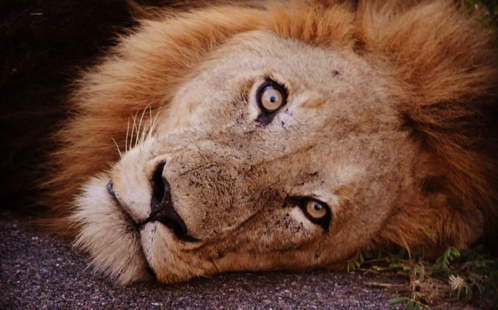
"The class begins with geology and works its way to more complex issues, such as dealing with the competing agendas of multiple stakeholders," says Dr Brett Bennett, from the School of Humanities and Communication Arts.
"The first lecture is on top of a 3 billion year old weathered granite dome overlooking the park, and the last is a hike to a 300-400 year old rock art site created by the Khoi-San."
"It's these field based experiences that allow students an intimate understanding of the history of the land, as well as how it's changing nowadays, be that through the creation of watering holes, or the changing population of animals."
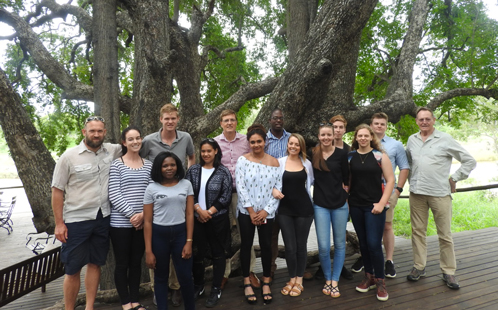
Students on the trip are hosted by the Nsasni Trust, a not-for-profit entity that trains South Africans and only hosts a limited number of study abroad trips. It is the only trip led by an Australian university with this level of access to the park.
The project is interdisciplinary, with students from Bachelor of Science (Zoology), Bachelor of Arts and Bachelor of Arts (Communications).
Professor Gregory Barton, who also leads the trip, points out that it's a testament of the quality of Western Sydney University that we have been chosen to work with the Trust and the Skukuza Science Leadership Initiative.
"All of our funds go to helping previously disadvantaged South Africans gain biodiversity training to solve the problems of the future," he says.
"Its an incredibly exciting and rare experience because students actually get out into the field with the animals."
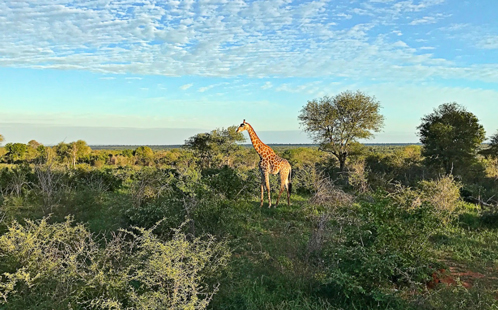
Dr Bennett emphasizes that all walks are protected from animals by armed official game-guards and are guided by WSU and South African teachers to ensure safety from animals.
"It is always exciting to see animals in the field; we've seen rhino, elephants, buffalo and a variety of other antelope in the field, but we always keep our distance," he says.
"Thankfully dangerous animals tend to run away – we came across a leopard once on a trip but it ran away as soon as we spied it on a rock near a river."
Dr Bennett says the students are also given the opportunity to be taught by one of South Africa's most distinguished scientists, Professor Fred Kruger. Other teachers include Dr Laurence Kruger, director of the Organization for Tropical Studies in South, with additional lectures provided by scientific staff living and researching in the Park.
Dr Bennett says he is currently working with Kruger on research exploring the history of the Sabie River catchment, which feeds into Kruger National Park.
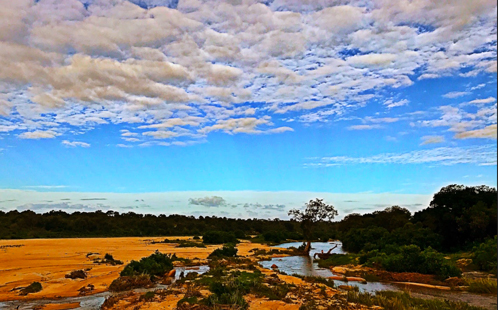
"The Sabie River is one of the country's healthiest aquatic ecosystem, and we are currently figuring out why," says Dr Bennett.
"As part of this, we're exploring the history of land-use, including the setting-side of land for forestry and the creation of settlements outside of the park in the 1930s."
The project is closely aligned with the University of Johannesburg, where Bennett and Barton both hold Senior Research Association positions. Students from the University of Johannesburg have participated in the last two units, and Dr Bennett says this type of cross-cultural engagement is one of the most enjoyable and meaningful aspects of the trip.
"The students come away changed positively for life," he says.
"Many are re-affirmed in their career goals, whereas others develop new visions. Some have gone on to PhDs related to conservation, whereas others go into a variety of careers and degrees. It is a special trip for all students."
Ends
Photos: Ashvitha Kannan
24 February 2017
Latest News

Western Sydney University ranks among world’s best for 23 subjects
The University has been named as one of the world’s top universities for the study of 23 subjects in the latest edition of the QS World University Rankings by Subject, including being ranked in the top 50 for Nursing.
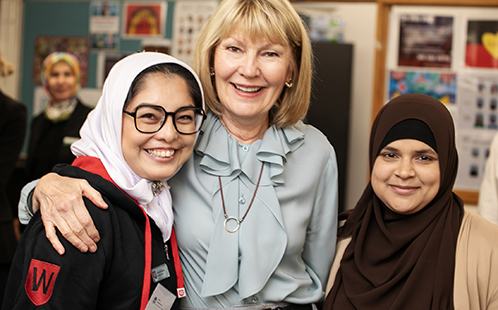
Western Sydney University receives landmark $7.9 million philanthropic gift from Harvey Norman to launch leadership academy, empowering young women in Western Sydney
Western has welcomed a landmark donation to establish the Harvey Norman® Young Women’s Leadership Academy Led by Katie Page.

Opinion: How much sport will you be able to watch for free under proposed new Australian broadcast rules?
Watching sport on television and other screens is integral to the cultural lives of many Australians.
Mobile options:

